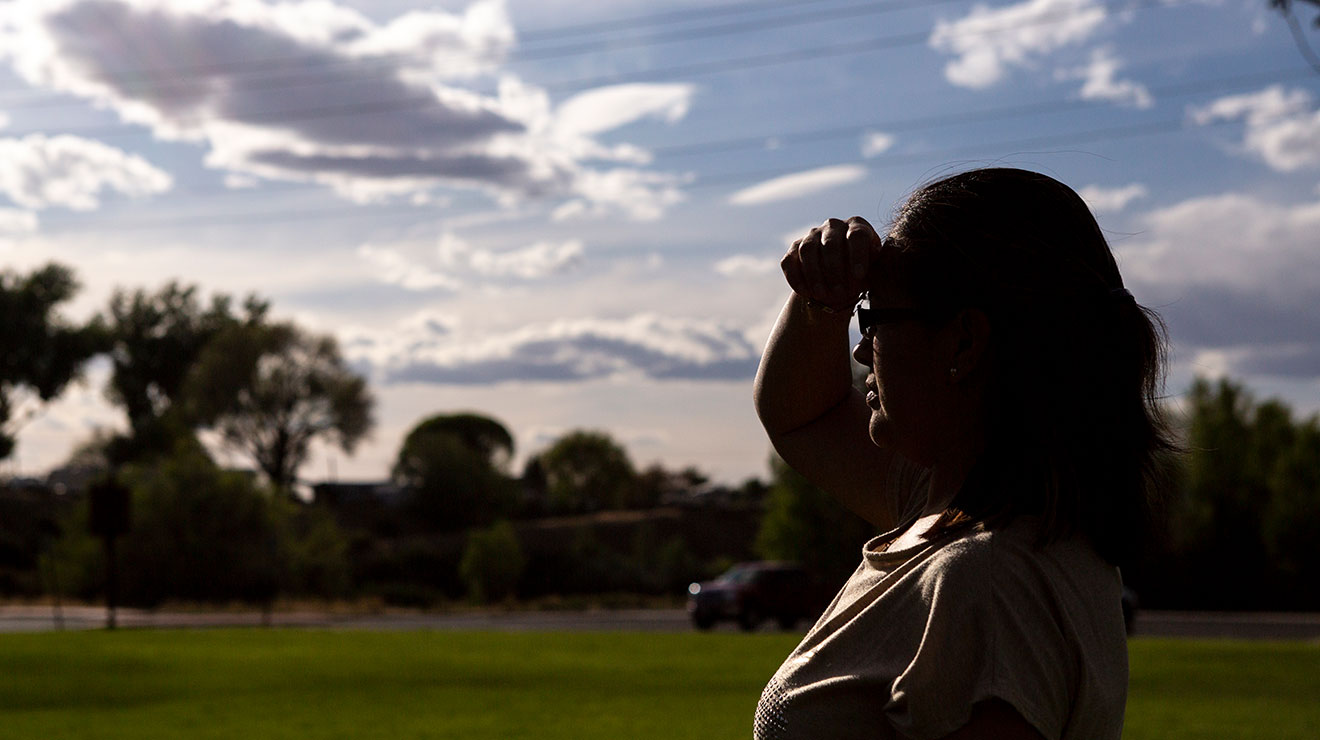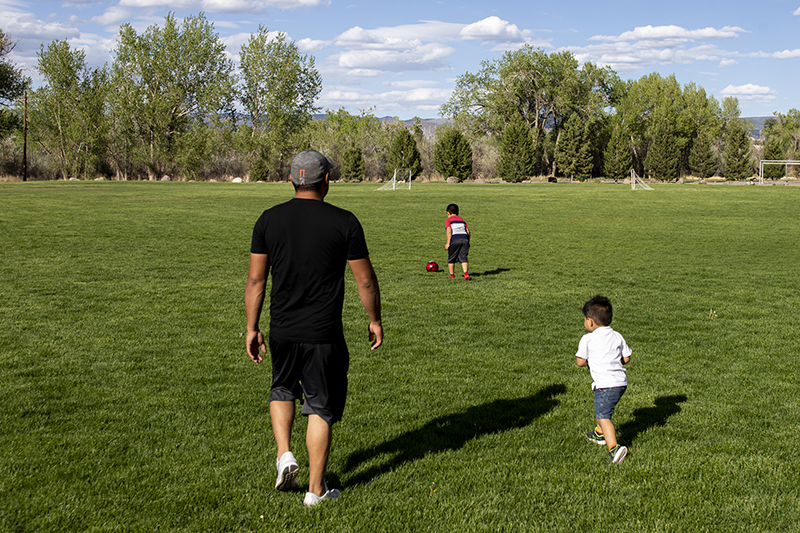
Victoria, in Montrose on May 13, 2020.
Photos by Luna Anna Archey
Victoria, in Montrose on May 13, 2020.
Photos by Luna Anna Archey
By Sarah Tory
Before the coronavirus pandemic, Victoria and Roberto were looking forward to bringing their three boys, ages 11, 8 and 2, to Disneyland during their school’s spring break in early April. (Their names have been changed for this article because of safety concerns over their immigration status.) Roberto had worked hard at his job as a construction worker in Telluride, Colo. to save up for the trip, and the kids were excited.
“We had so many plans,” Victoria told me when we spoke recently by video chat. Wearing glasses, with brown, shoulder-length hair, she let her youngest son, Alex, toddle into the screen, smiling. “Then the pandemic came and everything stopped.”
Victoria was born in Zacatecas, Mexico, where she grew up surrounded by escalating crime and violence fueled by drug cartels. By her late teens, Victoria’s father, brothers and much of her extended family had left for the United States. At 20, when her fear became too much to bear, Victoria decided to join them, hoping she could eventually bring her mother and sister.
In 2004, Victoria arrived in Montrose, 65 miles north of Telluride, where some of her family lived. She found work cleaning houses and she liked its peaceful small-town feel. She met Roberto two years later at a local soccer game. He was from the Mexican state of Durango and was also undocumented. They married later that year; three years later, they had their first child and then two more. They bought a little trailer and then another larger one with three bedrooms. Roberto built a treehouse in the backyard where the boys could play.
In mid-March, Colorado Gov. Jared Polis ordered the state’s ski resorts to close and Telluride, like other mountain towns, basically shut down. On March 21, San Miguel County, where Telluride is located, announced a locals-only policy, effectively barring entry to anyone residing outside the county and prohibiting all but essential services.
Roberto lost his job. Victoria’s work cleaning houses dried up, too. In a matter of days, they felt the stability they had worked so hard to cultivate for their children begin to crumble.
Victoria sat the kids down and broke the news: There would be no trip to Disneyland this year. What they were going to spend on the vacation, they now had to save for food and rent.
* * *
Like hundreds of thousands of families across Colorado, Victoria and Roberto are struggling to cope with the unprecedented economic and social impacts of the coronavirus crisis. But as undocumented parents, they are not eligible for any of the federal assistance made available to millions of families across the country to help them get through the pandemic. Nor are they eligible for unemployment benefits, even though Roberto pays taxes using an individual taxpayer identification number, a process used by many undocumented immigrants.
In Colorado, 109,427 U.S.-born children were living with at least one undocumented family member as of 2014, according to a 2017 report from the University of Southern California’s Center for the Study of Immigrant Integration using the most recent data available. Across the western part of the state, immigrants form the backbone of the region’s tourism economy, working in hotel, restaurant, maintenance and construction jobs that keep resort towns like Telluride and Aspen afloat. In 2018 alone, undocumented immigrants in Colorado paid more than $429 million in state and federal taxes.
But as the Trump administration uses the pandemic to push its longstanding goal of punishing undocumented immigrants, the vast majority of these “mixed-status” families will receive no federal stimulus money—not even the $500 allocated for each child. Many are now struggling to pay for rent, mortgages, utilities and basic necessities.
“There’s this huge inequity going on here with this community that’s always been there, but it’s coming to the surface in the moment we’re in,” said Karen Sherman Perez, the civic engagement coordinator for the Hispanic Affairs Project, a Montrose-based nonprofit serving Latino immigrant communities in western Colorado. (Hispanic Affairs Project is a Colorado Trust grantee.)
* * *
Victoria and Roberto first heard about the coronavirus in early March when the disease still seemed like an abstract concern. They started worrying when they learned that the virus had reached the U.S. and talk of mandatory quarantines began circulating.
One day in mid-March, Victoria went to the grocery store and panicked when she saw long lines and empty shelves and people driving cars full of food. She wrestled with how much to buy, worrying that if she stocked up, others might get nothing. Still, even when Roberto’s work stopped, Victoria remained stoic. “We just have to be patient,” she thought.
But as the weeks have turned into months, things are now feeling more desperate. Their savings are disappearing and neither Victoria nor Roberto know when—or if—their work will resume.
Meanwhile, they struggle with how to tell their children about their financial situation. When Alex reaches for another apple or orange, Victoria can’t bring herself to stop him. Even if she could tell him the truth—that money is tight and they have to conserve their resources—she knows a two-year-old wouldn’t understand. Instead, she and Roberto have decided to eat less themselves.

Roberto and two of their three children, Alex and Luis, in Montrose on May 13, 2020.
A few weeks into the quarantine, Perez began hearing from more families in distress. Initially, many were hesitant to express their concerns or ask for help, but by early April, people had started confiding that they didn’t know how they would pay rent.
Many immigrants that Perez spoke to were fearful about applying for unemployment and other government benefits like food stamps and Medicaid, due to the Trump administration’s new public charge rule. The regulation, announced in February, makes it easier for the government to deny a green card or visa to immigrants it believes are likely to receive certain public benefits in the future. Immigrants worried that accepting any kind of government aid during the pandemic would compromise their ability to adjust their immigration status, and though many of these worries are unfounded (unemployment, for instance, is an “earned benefit,” not a public benefit), the fear is ingrained in people’s brains, said Perez.
* * *
Across western Colorado, other immigrant families are grappling with similar challenges. Two hours northeast of Montrose, in the Roaring Fork School District, more than half of the kids are from Latino families, with parents who work in hourly jobs, usually without benefits, supporting the tourism and resort economy in nearby Aspen. Many of them are excluded from any government aid because of their immigration status. When the pandemic hit, school counselors spent three weeks calling every family in the district and referring those in crisis to the Roaring Fork School District Family Resource Center.
In that time, the center received 600 referrals for families unable to pay their bills. Many of these families already struggled with the region’s high housing costs, said Anna Cole, the family services director for Roaring Fork Schools. Now, she worries about how the financial distress will affect their kids’ education.
Though the center was able to work with a local internet provider to connect families previously without internet to Wi-Fi, ensuring kids are regularly checking in for online classes is proving more difficult. Without income, families in unstable housing situations, like those renting without a lease, are at risk of eviction.
“There’s no way kids will be doing algebra online if their basic needs and mental health aren’t covered,” said Cole.
These sorts of inequities are the subject of a new federal class action lawsuit filed on May 5 on behalf of U.S. citizen children whose undocumented parents are excluded from the $2 trillion federal coronavirus relief package, or CARES Act. The suit argues that the CARES Act discriminates against kids based on their parents’ immigration status, denying them benefits that other U.S. citizen children will receive during the pandemic. In Colorado, children will suffer disproportionately from this exclusion. The state has the ninth highest number of children living with undocumented family members, many of whom are likely to work in industries hardest hit by the economic crisis resulting from the pandemic.
In the meantime, local nonprofits are stepping in to help. At the end of March, the Hispanic Affairs Project launched the Western Colorado Immigrant Relief Fund, to provide financial assistance to undocumented immigrant families during the pandemic who do not qualify for state and federal assistance due to immigration status. (The Colorado Trust has contributed funding to this effort.) Rather than receiving cash, families or individuals can apply to the fund for specific things they need money for like rent, gift cards for food, and medical bills. So far, Hispanic Affairs Project has raised just over $100,000—a “drop in the bucket” compared to the need, said Perez, noting that when businesses do start up again, immigrant workers will likely be at the bottom of the re-hiring list.
“It still feels like the calm before the storm,” she said.
* * *
In early May, some stores and businesses in Montrose were re-opening and Roberto and Victoria’s eight-year old, Luis, needed to visit the doctor. Victoria bought masks for herself, Roberto and the boys, hoping to protect them; getting sick would be a disaster for her and Roberto, since neither has health insurance. For that reason, Victoria was actually relieved when the Montrose County School District closed down all its schools on March 13 and transitioned to online learning. She felt safer having her children at home where she could minimize their exposure to germs.
Remote learning has brought its own set of challenges for Victoria, whose English is limited. Her eldest child, Omar, can do his school assignments by himself, but Luis needs more support, which Victoria can’t always provide. They’ve devised a system: if Omar can’t help his younger brother, Victoria uses an online translator to translate the assignment into Spanish so she or Roberto can explain the assignment to Luis.
Despite the difficulties, Victoria has savored these moments with her kids. “I am learning together with them,” she told me.
Outside, the Uncompaghre Valley had burst into green and Victoria’s spring allergies were acting up when she took the kids to the park to play soccer or ride bikes. When we last spoke, the uncertainty of everything was beginning to wear on her and she confessed that the previous weekend, she was so tired she had to spend all of Saturday resting. But with the end of the pandemic still months or more away, patience is a luxury Victoria no longer feels she can afford.
Victoria and Roberto have always prided themselves on their work ethic. They had come to the United States to work hard, and the idea of simply waiting around for a handout was deeply upsetting for Victoria. Roberto agreed: “We have to do something to eat and to pay our bills,” he said.
Recently, Victoria started making tamales to sell and Roberto has found occasional work helping neighbors and friends with odd jobs. They were able to make last month’s mortgage payment, and Victoria is buying only the cheapest items at the grocery store now, hoping to stretch their savings as long as possible.
Every day, she prays it will be enough.